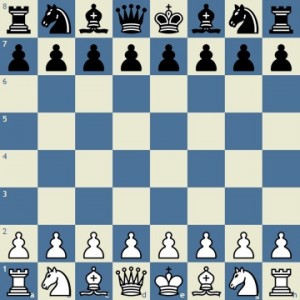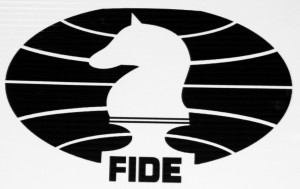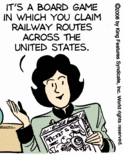Cheating Suspicions Shake Up Chess Championship
02 Jun
Posted by David Miller as Classic Board Games
 At the European Women’s Chess Championship WGM Mihaela Sandu (2300) of Romania pulled in to an unexpected early lead with five straight victories. She lost in the sixth round, which due to technical difficulties was not broadcast live over the internet, and then won again in the seventh when the broadcast was restored. Some of the other players became concerned about possible cheating and 32 posted to a bulletin board two letters asking tournament organizers to institute a 15 minute delay in the transmissions. The organizers assented “to avoid any suspicion of cheating,” after which Ms. Sandu lost her remaining four games and ended up in 26th place.
At the European Women’s Chess Championship WGM Mihaela Sandu (2300) of Romania pulled in to an unexpected early lead with five straight victories. She lost in the sixth round, which due to technical difficulties was not broadcast live over the internet, and then won again in the seventh when the broadcast was restored. Some of the other players became concerned about possible cheating and 32 posted to a bulletin board two letters asking tournament organizers to institute a 15 minute delay in the transmissions. The organizers assented “to avoid any suspicion of cheating,” after which Ms. Sandu lost her remaining four games and ended up in 26th place.
No specific evidence, however, was brought forth to show that Ms. Sandu cheated. The Romanian Chess Federation pushed the organizers to follow FIDE procedures regarding false accusations, pointing out the stress that the bulletin board letters caused for their teammate. And Mihaela Sandu herself published a letter of response to what she described as “a very dirty attack, permanently damaging my name in the chess world” and causing “enormous psychological pressure” during the games.
Ms. Sandu’s letter also called out GM Natalia Zhukova (2456) of Ukraine for instigating the attack, describing her as the “main benefactor” and her actions as “paltry behaviour.” It was, in fact, Zhukova who was Sandu’s opponent in the eighth round. Zhukova not only won that game but went on to win the tournament.
By the tenth round, two player who signed the original complaint asked to have their names withdrawn.
- Comments Off on Cheating Suspicions Shake Up Chess Championship
 FIDE (the World Chess Federation) is undertaking greater efforts to combat cheating at Chess tournaments. Aimed primarily at the possibility of players obtaining the aid of computers, FIDE plans to establish a permanent Anti-Cheating Commission and to adopt security measures for screening players and segregating them from spectators. Security measures may include searches and metal detectors, depending on the significance of the tournament.
FIDE (the World Chess Federation) is undertaking greater efforts to combat cheating at Chess tournaments. Aimed primarily at the possibility of players obtaining the aid of computers, FIDE plans to establish a permanent Anti-Cheating Commission and to adopt security measures for screening players and segregating them from spectators. Security measures may include searches and metal detectors, depending on the significance of the tournament.
Additionally, FIDE is in the process of developing a computerized tool that identifies cheating through statistical analysis of completed games. The tool is based on the work of Professor Kenneth W. Regan of the University at Buffalo Computer Science department, and rather than evaluating a player’s likelihood of winning, looks at the quality and consistency of individual moves. Dr. Regan’s research, for example, shows that human Chess players are more likely to make mistakes the further ahead or behind they are, whereas computer players perform consistently despite the present game state.
- Comments Off on New Anti-Cheating Measures for Chess
Players Make Public Statements Following 2014 Ticket To Ride Championship Controversy
12 Nov
Posted by Thomas Deeny as Classic Board Games
 Following Days of Wonder’s public statements about the 2014 Ticket to Ride World Championship, the two players involved have issued public statements about the best-of-three match in question.
Following Days of Wonder’s public statements about the 2014 Ticket to Ride World Championship, the two players involved have issued public statements about the best-of-three match in question.
Erwin Pauelsen, the player stripped of the title, said that after playing eight Ticket to Ride games that day, he inadvertently picked up extra cards in the second game of the final (English translation), a mistake that went unnoticed by either player or the table judge. Tournament rules state that Days of Wonder has the right to reassign the winner of a match in case of any irregularity. As the recording of the match shows Mr. Pauelsen taking the cards, it provides Days of Wonder sufficient reason to not award the prize to him. “The organization wanted the trophy back and I agreed.” Mr. Pauelsen has consulted with a lawyer afterwards, “but she stated the pre-defined rules of the organization would render a case useless”.
On BoardGameGeek.com, Kenneth Heilfron, states that he was cheated against during the championship finals, pointing out the math behind the game. If no cheating occured during the match in question, with the number of turns played and the number of trains placed on the board, he should have had six extra cards in his hand at the end of the game. Mr. Heilfron suggests multiple explanations for this, which point to some purposeful action by Mr. Pauelsen. “It was no accident, and it is not something the judge or myself could catch easily.”
- Comments Off on Players Make Public Statements Following 2014 Ticket To Ride Championship Controversy
2014 Ticket to Ride World Champion Resigns Title After Cheating Revealed
04 Nov
Posted by Thomas Deeny as Classic Board Games, Modern Board Games
 Erwin Pauelsen (Netherlands) has resigned his title as 2014 Ticket to Ride World Champion after admitting to cheating in the second game of the final held in Issy-les-Moulineaux near Paris, France. Online spectator “Knock-Chiroubles”, viewing the championship via Days of Wonder’s streaming, analysed the match between Erwin Pauelsen and Kenneth Heilfron (North America) and posted his findings to the Days of Wonder forum. The forum member stated that during the game in question, Pauelsen took 30 turns while Heilfron took 28, despite Heilfron being the first player in the game and the last to take a turn. The forum member concludes his analysis by noting that there were “3 missing turns for Kenneth in this game”. Another poster states that while watching the live stream, he realized that at some point Pauelsen attempted to play twice in a row and Heilfron, who was showing signs of fatigue, did not notice.
Erwin Pauelsen (Netherlands) has resigned his title as 2014 Ticket to Ride World Champion after admitting to cheating in the second game of the final held in Issy-les-Moulineaux near Paris, France. Online spectator “Knock-Chiroubles”, viewing the championship via Days of Wonder’s streaming, analysed the match between Erwin Pauelsen and Kenneth Heilfron (North America) and posted his findings to the Days of Wonder forum. The forum member stated that during the game in question, Pauelsen took 30 turns while Heilfron took 28, despite Heilfron being the first player in the game and the last to take a turn. The forum member concludes his analysis by noting that there were “3 missing turns for Kenneth in this game”. Another poster states that while watching the live stream, he realized that at some point Pauelsen attempted to play twice in a row and Heilfron, who was showing signs of fatigue, did not notice.
In the weeks following the championship, which was held on September 27th, Days of Wonder stated they had reviewed the final matches and “found evidence of cheating during the 2nd game of the final. Mr. Pauelson has admitted to his dishonesty and agreed to hand back his title and trophy.”
Kenneth Heilfron has been officially declared the 2014 Ticket to Ride World Champion and will receive the grand prize of a trip for two nine-day trip to Asia, including three nights on board the Eastern & Orient Express.
Mr Pauelsen was the 2010 Catan World Championship winner and came in tenth place in the 2012 Catan World Championship.
Trending
- Massdrop.com
- Oh the Irony—Illuminati Card Game Continues to Inspire Conspiracy Theorists
- Home
- Footprints, an Educational Ecology Game
- USPS Adds Board Game Flat Rate Box
- Baila, the Estonian Drinking Card Game
- Crystal Caste Wins Dice Patent Suit Against Hasbro
- Mirror Game, Red and Blue
- Are Board Games Dangerous?
- The Truth About Dominoes On Sunday in Alabama
Archives
Most Popular Articles
- Oh the Irony—Illuminati Card Game Continues to Inspire Conspiracy Theorists
- The 20 Most Valuable Vintage Board Games
- The Truth About Dominoes On Sunday in Alabama
- Sequence Game, and Variants
- USPS Adds Board Game Flat Rate Box
- Baila, the Estonian Drinking Card Game
- The 13 Most Popular Dice Games
- Are Board Games Dangerous?
- Guess Who? The Naked Version
- What Happened to the Jewel Royale Chess Set?
Recent Posts
- Toy Fair 2019—Breaking Games
- Talisman Kingdom Hearts Edition
- Toy Fair 2019—Winning Moves
- Toy Fair 2019—Games Workshop
- Toy Fair 2019—Star Wars Lightsaber Academy
- Toy Fair 2019—Stranger Things Games
- Toy Fair 2019—HABA
- Licensing Roundup
- Game Bandit
- 2018 A Difficult Year For Hasbro But Not For D&D Or MtG
Recent Comments
- on Toy Fair 2019—Winning Moves
- on Game Bandit
- on Second Look—Dungeons & Dragons Waterdeep Dragon Heist
- on Crowdfunding Highlights
- on Beyblade SlingShock
- on Game Bandit
- on Game Bandit
- on Watch This Game!, the Board Game Review Board Game
- on Second Look—Vampire: The Masquerade 5th Edition
- on Palladium Books Loses Robotech IP License, Cancels Five-Year-Overdue Robotech RPG Tactics Kickstarter




